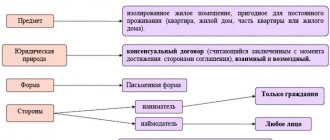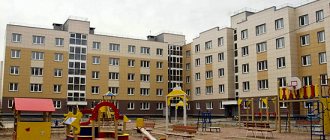Article updated: April 2, 2021
Mitrofanova SvetlanaLawyer. Work experience - 15 years
Hello. In short, the procedure for privatizing a municipal apartment in 2021 is as follows: 1) Register the apartment with the cadastral register if it is not included in it; 1) Collect documents; 2) Submit documents to the body that is authorized to accept these documents. After checking the documents, a privatization agreement will be drawn up; 4) Submit documents to the MFC or the Registration Chamber to register ownership of the apartment.
Important! In the article I described only the general procedure and the list of necessary documents. Indeed, in any city or region, the procedure for privatizing apartments and the list of required documents are different, because each has its own official administrative regulations for privatization . For example, in one city you must submit some documents yourself, while in another, privatization employees themselves request them wherever necessary. Despite this, I still pointed out some nuances of different cities. If you have any questions, ask them online to a lawyer in the window at the bottom right of the screen, call the numbers in the site header or in the comments.
An apartment can be privatized even with debts on utility bills
Stages:
- Stage No. 1 – register the apartment with the cadastral register
- Stage No. 2 – collect documents
- Stage No. 3 – submit documents for drawing up a privatization agreement
- Stage No. 4 – submit an agreement to the MFC or the Registration Chamber to register ownership of the apartment
Conditions and grounds
| Who can privatize? | Who is not eligible for privatization? |
| The person indicated in the social tenancy agreement as the tenant. It is this person who should be the initiator of housing re-registration. Even if other people are registered in the apartment at the same time. A prerequisite for privatization is permanent residence at the address indicated in the application for a long time (in some cases this has to be proven documented) | Citizens who have previously used the opportunity to participate in free privatization. According to Article 11 of Federal Law No. 1541-1, participation in privatization is available to every adult citizen once in a lifetime. If a person participated in privatization as a child, after 18 years he will have this opportunity again |
| Relatives of the employer living with him. Everyone registered in the apartment must either agree to participate in privatization or record their refusal in writing in favor of a family member | People living but not registered in the apartment. Even if the tenant once decided to accommodate third parties without officially registering them, the guests do not have any rights to the occupied housing. Not only do they not have the right to participate in privatization, but they can also be forcibly evicted by the owner at any time on absolutely legal grounds. This rule also applies to relatives of the employer. |
| Convicts and serving in the army. When a citizen previously registered in municipal housing ends up in prison or moves to a military unit to serve in the army, he is temporarily deregistered at his place of residence, but retains the right to participate in privatization. At the same time, all documents must be handled by the relatives of the person convicted or serving in the army, and he, in turn, is obliged to sign consent or refusal of the procedure | Persons who have entered into a sublease agreement with the main employer. Such a fixed-term compensation agreement can be concluded between new residents and the tenant during the latter’s vacation or business trip |
| Poor people. Privatization of housing for these categories of citizens is carried out in a simplified manner. To speed up the process, you should contact the Social Security authorities. | |
| Military personnel. This category of persons can privatize a service apartment, provided that the management of the unit, by appropriate order, allows the housing to be transferred to municipal status |
Legal status of the document
An agreement is a bilateral document signed by the self-government bodies of the settlement and the employer, drawn up in accordance with Article 60 of the Housing Code of the Russian Federation.
Based on the agreement, the tenant has the right to unlimited use of housing owned by the state.
Based on the document (Article 19 of the Housing Code of the Russian Federation and 672 of the Civil Code of the Russian Federation), citizens are provided with housing of public forms of ownership.
The contract is unlimited and is concluded with low-income people and other categories of citizens , according to lists corresponding to the article of the Housing Code of the Russian Federation. The size of the housing corresponds to regional standards (Art.,).
The agreement specifies the procedure for moving into municipal housing and the conditions for eviction of tenants .
By law, tenants are required to vacate the premises when moving or checking out. To acquire full rights to real estate, citizens can privatize it. In this case, you will not have to return the living space to the authorities.
You can learn about the rights and responsibilities of the owner and those prescribed in privatized housing, as well as what the owner of privatized square meters will have to pay for out of his own pocket from our articles.
Advantages and disadvantages
Along with the undeniable advantages of privatization, there are also disadvantages; for clarity, we have collected all the positive and negative consequences of converting housing into private ownership in a small table:
| Pros of privatization | Disadvantages of privatization |
| From the moment of receiving a certificate of ownership, each person participating in privatization becomes the sole owner of a certain share in the apartment and can dispose of it at his own discretion | Every year you will have to pay a tax for real estate which is 0.3% of the total cost of square meters |
| Owners cannot be evicted, even if they have accumulated large rent arrears | Utility bills will increase |
| During renovations, you can now not only glue wallpaper and paint floors, but also carry out redevelopment (be careful with load-bearing walls) | The owner will be responsible for maintaining the house, which means he will also have to pay for major repairs himself. |
Stage No. 1 – register the apartment with the cadastral register
First, check whether the apartment is registered in the cadastral register: 1) Go to the Rosreestr website using this link. 2) Enter the address of the apartment and click on the “Formulate a request” button. Examples of how to enter apartment addresses:
,
,
,
. Don't forget to enter the body if you have one. 3) If the message “No data was found that satisfies your request” is displayed at the bottom. Try changing the request,” then the apartment most likely is not registered in the cadastral register, because its data is not in the State Property Committee of Rosreestr. If the apartment address and cadastral number are shown, as shown in
, then it is on the cadastral register. You can then immediately move on to stage No. 2.
A small digression - if you need a free consultation, write online to the lawyer on the right or call (24 hours a day, 7 days a week) (Moscow and the region); (St. Petersburg and region); 8 (800) 350-24-83 (all regions of the Russian Federation).
If the apartment is not registered in the cadastral register, first you need to obtain a technical passport for it. To do this, you need to contact the BTI or the MFC. Have a Russian passport and a warrant or social tenancy agreement with you. The cost of the document is from 900 rubles, you can pay for it at the institution itself. Receipt time is 7-14 days. If the apartment has not undergone a technical inventory, then a technician will come to the apartment. He will measure the apartment, assess its condition and send the data to the BTI. After this, on the appointed day you can pick up the technical passport. If the apartment has undergone a technical inventory, a technician’s visit is not necessary; you can simply pick up the registration certificate on the appointed day.
The technical passport is in hand, now you can register the apartment with the cadastral register. To do this, contact the MFC or the Cadastral Chamber. The process of cadastral registration in these institutions is the same. Bring with you a Russian passport, a warrant or social tenancy agreement, and a technical passport. The employee will fill out an application that must be signed. On the appointed day, an employee of the Cadastral Chamber must arrive at the apartment. He will measure the apartment to enter this information into the State Property Committee. After this, on the appointed day, you should come to the institution and pick up an extract from the Unified State Register of Real Estate about the property. This extract will show the cadastral number of the apartment and other information from the State Property Committee. This means that the apartment is registered in the cadastral register.
Other articles
After privatization, the apartment can be sold. My colleague Elena Grushina compiled a list of documents for selling an apartment. Elena is a realtor with a legal education
How to privatize an apartment or housing under a social tenancy agreement
Municipal housing is provided to a citizen indefinitely, but after his death the legal heirs will not receive anything. Changing the status of the object will help correct the situation.
Order
Having decided to re-register the apartment as your own, proceed in the following order:
- take the application for privatization to the local administration;
- collect the necessary documents;
- pay the state fee;
- receive a decision from the mayor's office;
- register housing rights in Rosreestr.
Procedure
At each stage you must act carefully and responsibly. First of all, you should ask the local administration for information about the owner of the apartment in order to know where to send the application for privatization. In most cases, municipal real estate is rented out for social rent, but, for example, when housing is for official use, the owner is the state.
When preparing documents, you will need to go through several authorities:
- BTI;
- UVM;
- MARRIAGE REGISTRY;
- guardianship.
Each person participating in privatization must provide their own package of documents.
As soon as the application is reviewed and approved, the tenant and other participants in the procedure will need to sign a privatization agreement with the administration and only then can they contact Rosreestr to register municipal housing as private property.
Termination of a social tenancy agreement occurs simultaneously with receipt of a certificate of ownership and an extract from the Unified State Register of Real Estate.
Statement
The application for privatization must indicate:
- Full name and contact details of the employer;
- name and contact details of the owner;
- the exact address of the object being re-registered and its area;
- the purpose of privatization;
- information about previous participation in other privatizations.
Required documents
To successfully carry out the procedure, each participant needs to collect two packages of documents: for the mayor’s office and for the registrars.
The administration must include:
- passports (copies and originals), birth certificate for children;
- social tenancy agreement;
- technical passport from BTI;
- an extract from the apartment register;
- a certificate stating that none of the participants has previously privatized housing;
- a document confirming the absence of debt to utilities;
- written consents or notarized refusals for privatization from all registered persons.
Additionally:
- former prisoners must bring a certificate of release;
- former military personnel - a copy of the order of the Ministry of Internal Affairs on dismissal from the unit;
- parents of minor participants - permission from the Guardianship and Trusteeship authorities.
The package of documents for Rosreestr should consist of:
- statements from each participant;
- passports (preliminarily make copies of the main page and the spread with registration);
- all existing refusals from privatization;
- a copy of the social tenancy agreement certified by a notary;
- certificates of non-participation in privatization earlier;
- consent of the guardianship authorities;
- receipts for payment of state duty.
Expenses
Free privatization implies that the transfer of an apartment from the state to an individual is carried out free of charge, you will not have to pay any money for the square meters received, but services for checking and processing documents are provided by government agencies on a paid basis.
Expect that:
- for the issuance of a technical plan (floor plan and explication) you need to pay a minimum of 1000 rubles;
- for an extract from the Unified State Register of Real Estate - 200 rubles per participant;
- for the privatization of housing in the mayor's office - the state duty is 2000 rubles per person.
Deadlines
Unlike low-income categories of citizens, for whom social security does all the work in just two weeks, the rest will have to wait for a certificate of ownership for several months:
- It usually takes from 30 to 60 days for the administration to process the request;
- Rosreestr reviews the application within 5 working days;
- The transfer of ownership rights takes place within a month.
When can privatization be refused?
There are some objects of the state and municipal housing stock that are not subject to free privatization, these include:
- most service apartments;
- separate rooms in an existing dormitory;
- housing belonging to the reserve fund;
- apartments in any of the military closed towns.
Privatization of these real estate objects will become possible only after their transfer to municipal ownership (the procedure is carried out in court).
Sometimes there is no consensus between people living in an apartment regarding privatization; it happens that 5 people want to become the legal owners of square meters as quickly as possible, and one, not wanting to pay high real estate taxes, does not agree to anything. Oddly enough, there are a lot of such cases in life.
Example. The Garchev family, who were officially recognized as low-income, were given a municipal apartment. After some time, the eldest son got married and decided to privatize housing. The wife and mother, living together with the initiator, expressed their consent, but the father, who by this time had already reached retirement age, was against it. No amount of persuasion helped, and signing the waiver didn’t suit him either. It turns out that the man made a decision long ago - to live in a municipal apartment for the rest of his life and he does not intend to deviate from his principles. The family had no choice but to abandon privatization for a while.
If you are faced with such a situation, remember that you can only persuade a tenant to privatize with reasoned convictions:
- give the family member as many arguments as possible in favor of privatization;
- invite him to sign a waiver of privatization, explaining that in this case the tenant retains the right to live in this apartment for life.
Threats, blackmail and physical coercion will lead to the fact that you will not only fail to privatize municipal square meters, but will also have to spend some time in prison. You can learn more about how to privatize a share in an apartment from this article.
Legislative norms
The regulations for the privatization of housing are contained in the Law of the Russian Federation No. 1541-1.
According to this law, housing provided for rent in this way is included in the list of real estate objects subject to registration as property free of charge.
The contract includes everyone registered in the living space , including minors. If, at the request of the tenant, outsiders moved in during the term of the agreement, they are recognized as members of the tenant’s family, are included in the documentation and receive a share in the living space.
The area of the premises is divided into equal parts (shares) among all those registered in it. Persons who previously participated in privatization do not receive a share in this premises.
The right to re-participate in the process is given to persons who previously took part in the process under 18 years of age, as well as citizens who have deprivatized previously registered housing (Decision of the Committee on Commercial Economy No. 15).
The privatized property must be included in the list of buildings subject to transfer into the ownership of citizens. If it is located in a dilapidated building, has departmental status or is part of a reserve fund, it cannot be privatized.
Registration of real estate ownership from the Ministry of Defense has some features. Its registration requires removal of its official (departmental) status. This procedure is carried out with the participation of the Ministry of Defense and requires additional documentation.
Read about the procedure for deprivatization of residential premises in our article. Also find out about the statute of limitations for invalidating a procedure.
What is the procedure for privatization under a social tenancy agreement?
Possible reasons for refusal to privatize
Privatization may be refused. The reasons for this are the following:
- Living space is not subject to privatization.
- There is no consent from any of the registered persons.
- The apartment was subject to illegal redevelopment.
- Providing incorrect documents.
An unlawful refusal can be challenged in court. In this case, it is advisable to contact a lawyer.
You can get free legal advice on our website. Describe your situation in the special window.
The opportunity to obtain ownership of a municipal apartment is not limited by time frames, so privatization of housing under a social tenancy agreement can be carried out at any time.
Deadlines
The actual process of reviewing an application for privatization takes about 2 weeks. However, privatization itself, if we count from the moment of the start of actions in this direction, takes on average about 2-3 months. At the same time, you need to take into account that some documents have a limited expiration date, so you need to receive them as a last resort, right before submitting your application.
- Technical passport BTI. It does not have an expiration date, but it takes about 1-1.5 months to compile it.
- A personal account for housing, which indicates the debt (if any). It is made quickly, but has a shelf life of only 30 days.
- Extract for an apartment/house from the Unified State Register. Valid for only 7 days. In some cases it may be extended up to 30 days.
- An extract from the house register is valid for only 14 days.
Thus, you first need to wait for the technical passport, since it is the one that takes the longest to complete and at the same time, has no expiration date. Then collect the remaining documents, which also do not have an expiration date. And only after that, order in order a personal account, an extract from the house register and an extract from the Unified State Register for the premises.
Subtleties
- The law assumes that the privatization procedure is voluntary. Citizens have the right to agree to it or refuse it.
- Registration of property rights is paid; the state fee is 2 thousand rubles for each participant. There is no need to purchase land at market or cadastral value.
- The privatization agreement is drawn up in a standard form and is concluded between the administration and individuals. Issued in one copy, regardless of the number of owners. If necessary, make notarized copies.
- Most often, municipal housing is taken into private ownership, since public housing is more expensive and is sold through bidding or auctions.
How long will the procedure take?
The total period for completing the privatization of an apartment depends on the time it takes to collect the full package of documents. On average, the process usually takes 60-70 days, of which:
- processing the request in the administration – from a month to two;
- consideration of the application in Rosreestr – from 5 days;
- registration of transfer of ownership – from two weeks to a month.
The application can be submitted through the State Services portal, and thereby speed up the processing process.










